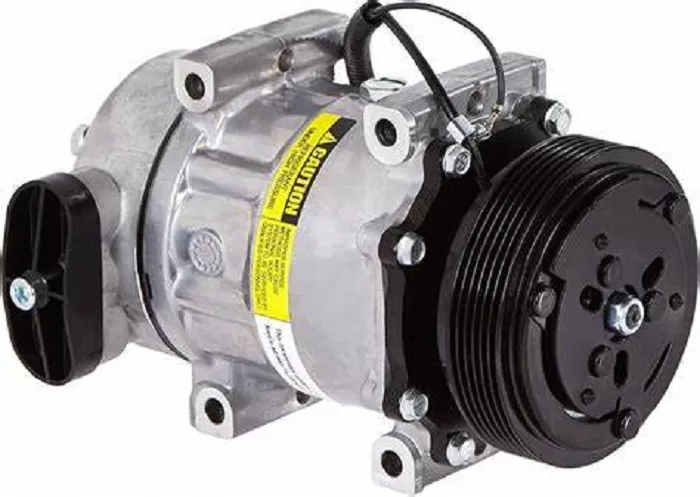A malfunctioning AC compressor can lead to poor cooling performance, increased energy consumption, and even complete system failure. As the heart of the air conditioning system, the compressor plays a crucial role in circulating refrigerant and maintaining proper pressure levels. Identifying early warning signs of a failing compressor can save you from costly repairs or replacements.
Understanding the AC Compressor’s Role
Compresses Refrigerant: The compressor pressurizes low-pressure refrigerant gas from the evaporator and turns it into high-pressure, high-temperature gas.
Circulates Refrigerant: It pushes the refrigerant through the AC system, allowing heat exchange and cooling.
Maintains System Pressure: Proper pressure levels are essential for efficient cooling.
Common Signs of a Bad AC Compressor
Warm Air Blowing from Vents
Symptoms
- The AC blows warm or slightly cool air instead of cold air.
- No noticeable temperature drop even after running the system for a while.
Causes
- The compressor may not be circulating refrigerant properly.
- Low refrigerant levels due to leaks can cause compressor failure.
- Electrical issues (failed clutch, relay, or wiring problems).
Diagnosis
- Check refrigerant pressure with a manifold gauge.
- Inspect the compressor clutch for engagement when the AC is turned on.
Loud or Unusual Noises
Symptoms
- Grinding, squealing, or rattling noises from the compressor.
- Clicking sounds when the AC is turned on (indicating a failing clutch).
Causes
- Worn-out internal components (bearings, pistons, or valves).
- Lack of lubrication (low refrigerant or oil levels).
- Loose or damaged compressor mounts.
Diagnosis
- Listen for abnormal sounds when the AC is running.
- Inspect the compressor pulley and clutch for wear.
Hard Starting or Frequent Tripping
Symptoms
- The compressor struggles to start (hard starting).
- Circuit breaker trips frequently when the AC runs.
Causes
- Electrical failure (bad capacitor, relay, or wiring).
- Excessive pressure buildup in the system.
- A failing motor or seized compressor.
Diagnosis
- Test the capacitor with a multimeter.
- Check for voltage drops at the compressor terminals.
Leaking Refrigerant or Oil
Symptoms
- Oil stains around the compressor.
- Refrigerant leaks (hissing sound, oily residue near connections).
Causes
- Damaged seals or gaskets.
- Cracked compressor housing.
- Loose fittings or corroded refrigerant lines.
Diagnosis
- Use a UV dye or electronic leak detector to locate leaks.
- Inspect Schrader valves and connections.
High Energy Bills
Symptoms
- Sudden increase in electricity costs.
- AC runs longer to achieve cooling.
Causes
- Compressor working harder due to mechanical wear.
- Loss of efficiency from refrigerant leaks.
Diagnosis
- Compare energy usage before and after AC issues began.
- Perform a system efficiency test (SEER rating check).
Causes of AC Compressor Failure
Lack of Maintenance
- Dirty condenser coils reduce heat dissipation.
- Low refrigerant levels cause overheating.
- Clogged filters strain the system.
Electrical Problems
- Failed capacitors or relays prevent proper startup.
- Voltage fluctuations damage motor windings.
Refrigerant Issues
- Overcharging or undercharging affects lubrication.
- Moisture or contaminants cause acid formation.
Mechanical Wear
- Bearings and pistons wear out over time.
- Poor lubrication leads to metal-on-metal friction.
External Damage
- Road debris hitting the compressor (in vehicles).
- Corrosion from moisture exposure.
What to Do If Your Compressor Fails?
Professional Inspection
- A certified technician should diagnose the issue.
- Pressure tests, electrical checks, and leak detection are necessary.
Preventive Measures
- Schedule annual AC maintenance.
- Keep refrigerant at optimal levels.
- Clean condenser coils and replace filters regularly.
Conclusion
A failing AC compressor exhibits clear warning signs such as warm air, strange noises, leaks, and electrical issues. Early detection can prevent complete system breakdowns and costly repairs. Regular maintenance and professional servicing are key to extending the compressor’s lifespan.If you notice any of these symptoms, consult an HVAC specialist immediately to assess and resolve the issue before further damage occurs.

